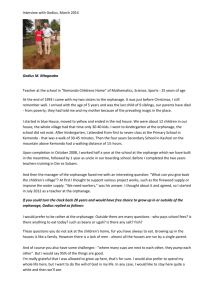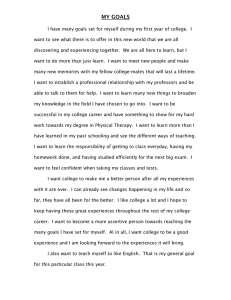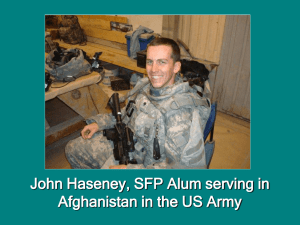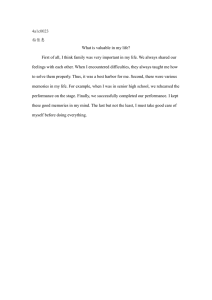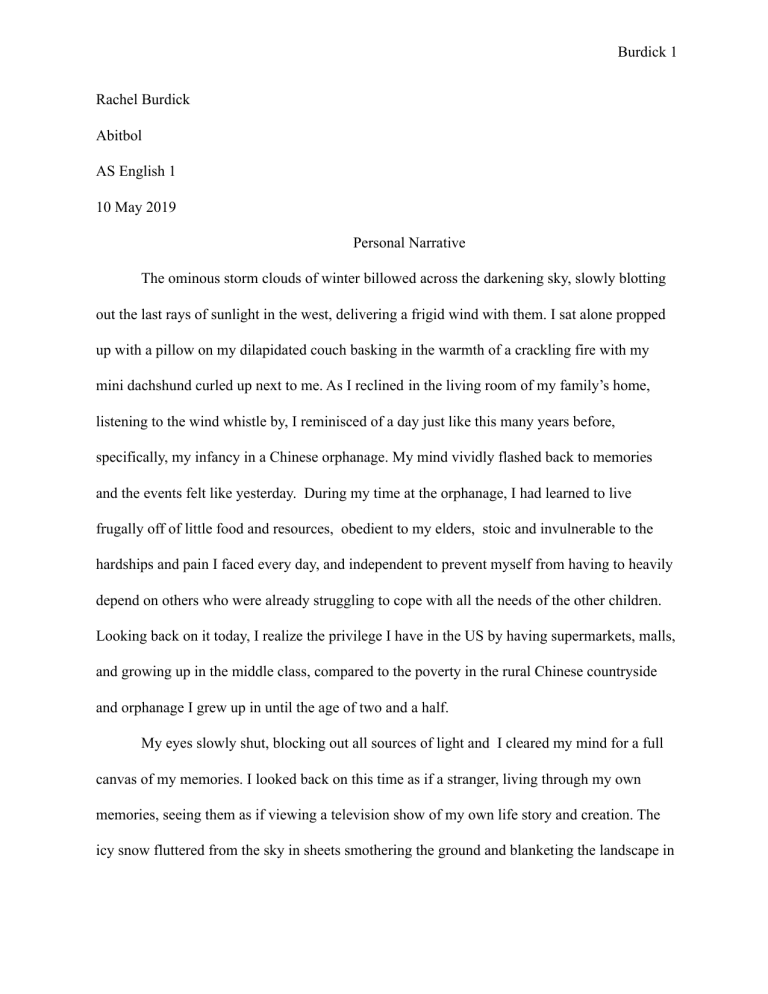
Burdick 1 Rachel Burdick Abitbol AS English 1 10 May 2019 Personal Narrative The ominous storm clouds of winter billowed across the darkening sky, slowly blotting out the last rays of sunlight in the west, delivering a frigid wind with them. I sat alone propped up with a pillow on my dilapidated couch basking in the warmth of a crackling fire with my mini dachshund curled up next to me. As I reclined in the living room of my family’s home, listening to the wind whistle by, I reminisced of a day just like this many years before, specifically, my infancy in a Chinese orphanage. My mind vividly flashed back to memories and the events felt like yesterday. During my time at the orphanage, I had learned to live frugally off of little food and resources, obedient to my elders, stoic and invulnerable to the hardships and pain I faced every day, and independent to prevent myself from having to heavily depend on others who were already struggling to cope with all the needs of the other children. Looking back on it today, I realize the privilege I have in the US by having supermarkets, malls, and growing up in the middle class, compared to the poverty in the rural Chinese countryside and orphanage I grew up in until the age of two and a half. My eyes slowly shut, blocking out all sources of light and I cleared my mind for a full canvas of my memories. I looked back on this time as if a stranger, living through my own memories, seeing them as if viewing a television show of my own life story and creation. The icy snow fluttered from the sky in sheets smothering the ground and blanketing the landscape in Burdick 2 translucent white snowflakes. Darkness soon engulfed the crisp, bleak air and a single light bulb lit the faded words “Xinhua Social Welfare Institute” on the side of a decrepit, austere building. The sound of dogs howling, babies crying, and the occasional snore interrupted the otherwise still, silent night as a single child with a notably distinctive split lip and cleft palate, not more than two years old, scampered across the orphanage preparing for slumber. If my memory serves me well, that child was me. For the purposes of this remembrance, we will call the toddler version of me, her or she as I find it easier to show the story through the lens of a narrator and to remove myself from these experiences; however, the effects of this experience, be it me or the girl, are the same. As I do not want to bring up old feelings of loneliness and desolation by recalling the memories so graphically and putting myself back in that place, for now, I shall tell the story through the third person. She crept down a narrow corridor watching her breath puff before her, silently passing through a hinged, screen door and entering a small room. The room was about 10 ft by 10ft space in size, lined with three beds, the larger of the three for the caregiver. In the room also laid a pair of wooden cots nailed together to form a communal bed, sleeping ten children at a time. She slithered under the thin blanket, making sure to not disturb her fellow bedmates and rested on the straw mattress waiting for the day to return. These were the resources and living quarters she had grown accustomed to living in and did not expect more from life then. Subsequently, the harsh conditions taught her tenacity and persistence to push through life’s hardships. In addition, she discerned to not stand out in a group but to adapt and change with her surrounding environment to blend in. Burdick 3 As the first rays of sunlight peeked from behind the storm clouds, a bell rang through the chilled air announcing breakfast. The young child awoke with a start, noticing the emptiness of the bed around her and the blissful silence of the room. Her mind immediately felt tortured by the scabies bites encasing the entirety of her frame and the itching sensation distracted her thoughts. Hastily dressing in a thin shirt and pants, not equipped for the weather of winter, and racing to the well outside the screen door to dash her face with icy water (the institute had no running, hot water), she padded barefoot down the hall, shivering as a draft blew through the thinly walled corridor across her gaunt, emaciated frame. Breakfast consisted of the usual small portion of gruel, hardly enough to suffice a toddler let alone the caregivers who lived, slept, and ate there 24/7. After “breakfast”, a determined look planted on her face, she marched to the orphanage director’s office for her daily directions. From these commands, she learned an everlasting lesson of servitude and obedience that could never be taught out of her internal framework. Subsequently, her quiet, observant deposition stayed with her as she aged and matured. As she could not speak well due to her incorrectly repaired cleft lip and palate, she communicated in movements while she listened to her orders obediently. She was assigned to help in the baby nursery and to carry the keys for the director to unlock the doors as per her normal duties. She ran across the snow-laden, cracked cement of the courtyard as the cold nipped at her bare feet to the baby nursery, already hearing the wailing of the children as she approached. She was greeted by an elderly woman, who was volunteering from the old folks home located on the first two floors of the building beneath the orphanage and began her assigned duties. The rest of the afternoon was spent putting fallen bottles back in babies’ Burdick 4 mouths, pushing strollers full of agitated babies, and a short break for lunch that was a tasteless broth soup with a few sliced vegetables and rice rationed to the orphans. With her daily duties, she was trained to work through physical pain but she also developed the mental toughness to survive the desolate environment and keep a positive attitude to each similarly resemblant day. In the late afternoon, an ancient, rumbling van had come to pick up and drive the adopted children to hotels for their later adoption. She, as the key keeper, had waited with the children getting ready to depart and amused them as the icy cold sliced through their spindly bodies. She watched in sorrow and longing as the van drove away up the narrow, dirt road without her, leading to modernized society and loving families. As night fell once again, she ran from the nursery to her bedroom to rest her tired limbs and discuss her day's adventures with her roommates until falling asleep once more. I awoke in a damp sweat, heart pounding in my chest from my heavy stupor of intense recollections to the ashes of the fire long burned out, wind howling outside, and murky darkness enveloping my shivering body. However, a warm sensation of love and appreciation for my adoptive family and the resources provided to me in America washed over me in waves of relief, giving me a sense of security, affection, and finally belonging. I wrung my clammy hands in my lap; took a couple of deep breaths, and wiped the dewy tears from my eyes as I reflected on my experiences of childhood and what I had learned from being at the orphanage. I can see within myself aspects of my impoverished past in my inner thoughts, outward manner, and personal values I have formed. I have found myself to be more observant and wary of the others around me, not often outspoken with objections, and I try to please people perhaps from my early duties of subjection and constantly having to obey others. Burdick 5 In addition, I find it harder than others to be open and vulnerable in the relationships I have. Instead, I keep my thoughts to myself, contemplate, and resolve them alone. In much of Chinese culture, it is looked down upon to show emotion or sensitivity and from childhood, I have embodied those ideals. With my second life in America, the unconditional love, and plethora of resources provided to me in Burlingame, I often find my compassion and understanding from the experiences I have had being expressed through generosity and wisdom bestowed through material goods given towards others and also an emotional solace and safe space for troubled, burdened minds in my life. With determination from an unforgiving infancy and humble upbringing, I’ve observed internal resilience that can often be misunderstood on the outside for miscommunication and not caring, while in reality, I weigh the pain of now versus the experiences of the orphanage and my immediate problems do not seem so huge. Subsequently, I have also gained perspective and insight into life’s ups and downs that puts me back to reality and adds a layer of depth to my emotions and thoughts. In my mind, I am simply living through what life hands me and the resources and people it gives me to do so. I promptly dismiss any negative thoughts, telling myself if I could survive conditions of poverty, I can survive my first world problems. The last thing I learned in my silent, internal monologue while sitting on my beaten, cloth couch was that family is not always blood-related, but people who will accept you no matter your faults. Family is people who will love you unconditionally no matter what, and care enough to support you through all of life’s mishaps, shortcomings, and adventures.


